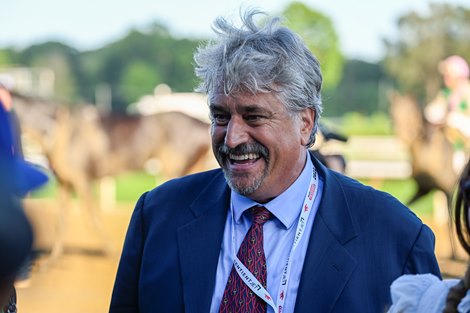Ruling there is a question of fact whether Steve Asmussen willfully violated federal wage and hour laws in Kentucky, a federal appeals court vacated a lower court judgment against the Hall of Fame trainer and sent the matter back to the trial court for further handling.
The long-enduring legal case began when Asmussen was charged in civil court by the U. S. Department of Labor with wage and hour violations in Kentucky. A federal district judge found against Asmussen and his KDE Equine, entering a judgment holding he failed to pay employees overtime wages of $211,541.76 for a period of two years.
Federal law has a two-year statute of limitations for such violations unless they are willful, when a three-year lookback and added damages are allowed. In round one at the trial court, Asmussen won that part of the case when the judge granted him a summary judgment, meaning the judge found no genuine issues of material fact that could result in a verdict favorable to the government.
Both sides appealed to the U.S. Sixth Circuit Court of Appeals, which in January 2023 found against Asmussen in two ways. The government’s judgment on the two-year overtime issue was affirmed, and the issue of willfulness was sent back to district court for a trial on the issue because, in the opinion of the appellate court, there were disputed issues of fact.
A different district judge then entered another summary judgment, not in favor of Asmussen but against him, instead of holding a fact-finding trial. In doing that, U.S. District Judge Claria Horn Boom assessed an additional penalty of $31,718.37 for a third year of operations against Asmussen, increasing total damages to $243,260.13, and assessed liquidated damages that effectively doubled the judgment to $486,520.26.
Sign up for BloodHorse Daily
On Asmussen’s second and most recent appeal, the Sixth Circuit again ordered a trial be held on the issue of willfulness. The appellate court opinion was entered Dec. 23.
“Two district courts studied the same factual record but came to opposite conclusions. One court held that no reasonable factfinder could conclude that KDE’s violations were willful; the other court held that no reasonable factfinder could conclude that KDE’s violations were anything other than willful,” wrote Amul R. Thapar for the unanimous three-judge appellate panel. “In our view, this disagreement suggests that a trial is necessary. To resolve the competing versions of events, testimony must be taken; credibility determinations must be made; and facts must be found.”
A key issue at trial will be how Asmussen responded when he was found to be in violation of regulations in the management of his New York stable. According to court records the trainer has evidence that new management methods in Kentucky had been approved by labor regulators in New York. The government says there is evidence to dispute that.
“In sum,” Thapar wrote, “a trial is needed to resolve disputed factual questions about whether KDE received assurances from regulators that its New York operations had come into compliance with state and federal labor law and, if so, how those assurances affected KDE’s mental state during the violations that gave rise to this case.”
The New York case, initiated in 2019, was settled when a consent judgment was reached between the U.S. Department of Labor and Asmussen in which the trainer paid $563,800 in back wages and liquidated damages toward 170 affected employees. Asmussen, who operates one of the country’s largest stables, was also sued by the New York Department of Labor in 2012.
The 2019 case was one of numerous actions the government brought against New York horsemen for alleged violations of the Fair Labor Standards Act of 1938.
The New York State Gaming Commission became the most recent agency to take action against Asmussen when it filed an administrative case purportedly seeking a suspension of his trainer and owner licenses for previously adjudicated labor law violations. The case was settled without a suspension. According to previous reporting at BloodHorse, in December, a process began to select an independent monitor in New York to regularly check on Asmussen’s compliance with labor laws. A monitor was set to be in place starting Jan. 1.
Attorney Clark Brewster represents Asmussen.

